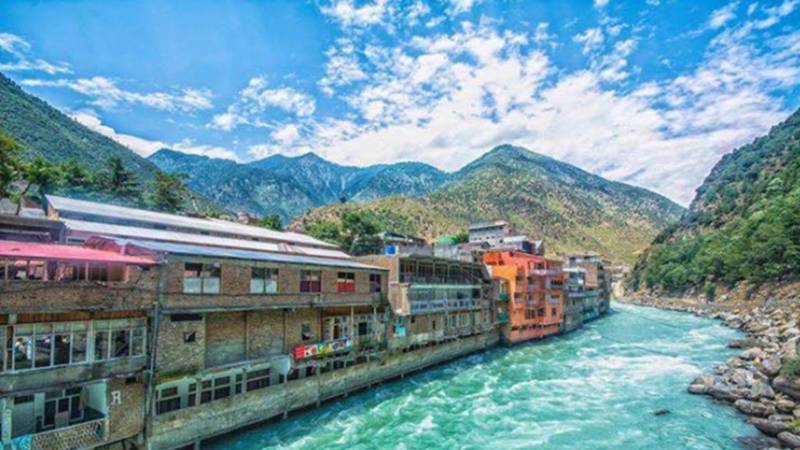
In the rugged landscapes of Khyber Pakhtunkhwa, where sheep farming has been a traditional livelihood for generations, climate change is posing severe challenges to shepherds. Changing weather patterns are affecting every aspect of sheep farming, from grazing to water availability, and even the health and productivity of livestock.
Muhammad Shah, a 62-year-old shepherd from Bihat Dughalguh, Kabal, Swat, has been struggling with the challenges brought about by climate change. “For decades, I have raised sheep, but now environmental changes are threatening my livelihood,” he shared.
Like many other shepherds in the region, Muhammad Shah migrates seasonally in search of better grazing conditions. During the harsh winters, he moves his flock to lower are”s such as Malakand, Charsadda, and Mardan. However, ongoing environmental shifts have made his work increasingly difficult.
“The biggest challenge we face is water scarcity,” Muhammad Shah explains. “In the past, streams and ponds provided enough water, but now they dry up quickly, leaving my sheep struggling, especially during the summer months.”
Water scarcity is not the only issue. Muhammad Shah also highlights the decline in the quality of grazing land due to irregular rainfall. “The pastures are no longer fertile, and my sheep aren’t getting the nutrition they need,” he adds, noting that this has weakened his animals and significantly reduced wool production—his primary source of income.
Naik Rehman, a 50-year-old shepherd, shares a similar story. With over 30 years of experience in sheep farming, he has witnessed drastic disruptions in weather patterns. “When it rains excessively, paths are blocked, livestock falls ill, and some sheep are even swept away by floods. On the other hand, during dry spells, fodder doesn’t grow, and water sources run dry,” he says, his voice tinged with worry. These shifting weather conditions have significantly impacted the health of his sheep, reduced milk production, and jeopardized his livelihood.
Climate change has also disrupted sheep reproduction, which traditionally occurred during winter. With winters becoming shorter, reproductive cycles have been affected, resulting in lower fertility and reduced milk production
He further explains how human activities have exacerbated these challenges. “Many areas that once had natural grasslands have now been replaced with houses and construction. Previously, it would take us around two months to migrate with our sheep from Kalam to lower areas like Mardan and Swabi. But now, these areas have become populated, and the natural grass is gone,” he laments.
To cope, Naik Rehman and his fellow shepherds have started transporting their sheep directly by truck, which shortens the journey by a month. However, he notes, “The grass we find there is no longer as abundant or nutritious as it was five, six, or ten years ago.”
Climate experts caution that the situation may deteriorate further in the coming years. Dr. Shaukat Ali, a renowned climate scientist, highlighted in a study published in the International Journal of Climatology that Pakistan’s average temperature is projected to increase by 2.6°C to 5.1°C by the end of the century. Northern regions, including Khyber Pakhtunkhwa, are likely to experience even greater temperature rises, intensifying the challenges faced by farmers and shepherds in these areas.
The role of sheep in maintaining ecological balance is invaluable. Dr. Muhammad Nafees, a Professor of Environmental Science at the University of Peshawar, emphasizes that sheep provide crucial environmental services, such as fertilizing fields and controlling invasive weeds. “These services are provided at no cost,” Dr. Nafees explains. “Sheep transport nitrogen, phosphorus, and carbon to remote areas, naturally enriching the soil. If the government were to perform these tasks, it would cost millions of rupees.”
Additionally, livestock plays a significant role in seed dispersal, enabling plants to grow in new areas and fostering biodiversity. Despite the challenges posed by climate change, sheep continue to offer these essential services without requiring electricity, roads, or fossil fuels.
Dr. Mukhtar Ahmad, a member of the Champions for Environment and Climate Action Community of Practice, states that heat stress arises when high temperatures combine with increased humidity, posing serious threats to livestock. Climate change has caused the monsoon season to begin earlier, leading to a rise in humidity in June instead of July. This shift intensifies heat stress, reducing animal fertility, weakening offspring, and increasing mortality rates. It also decreases feed intake, resulting in nutritional imbalances and a rise in diseases, ultimately compromising livestock health and productivity.
In the summer, nomads face significant challenges as they migrate with their livestock. Reduced rainfall, driven by climate change, has led to a scarcity of fodder and water in grazing areas, leaving animals deprived of essential resources.
Climate change has also disrupted sheep reproduction, which traditionally occurred during winter. With winters becoming shorter, reproductive cycles have been affected, resulting in lower fertility and reduced milk production. Furthermore, metabolic diseases are increasingly common, further deteriorating livestock health and productivity.
As climate change intensifies, the resilience of shepherds like Muhammad Shah and Naik Rehman is being tested. They are being forced to adapt by seeking breeds that are more resistant to harsh conditions. However, they are calling for immediate government intervention. “We need better access to water, affordable feed, and proper guidance to help us manage our livestock in these changing conditions,” emphasizes Muhammad Shah.
The government must act to support this vital sector of agriculture. Immediate measures are needed to ensure water and fodder availability, protect shepherds from natural disasters, and secure the future of sheep farming in Pakistan. Without this support, the livelihoods of thousands of shepherds, as well as the ecological health of the region, will continue to suffer.
The clock is ticking, and the time to act is now. Climate change is not just a future threat—it is a present crisis demanding urgent attention.

